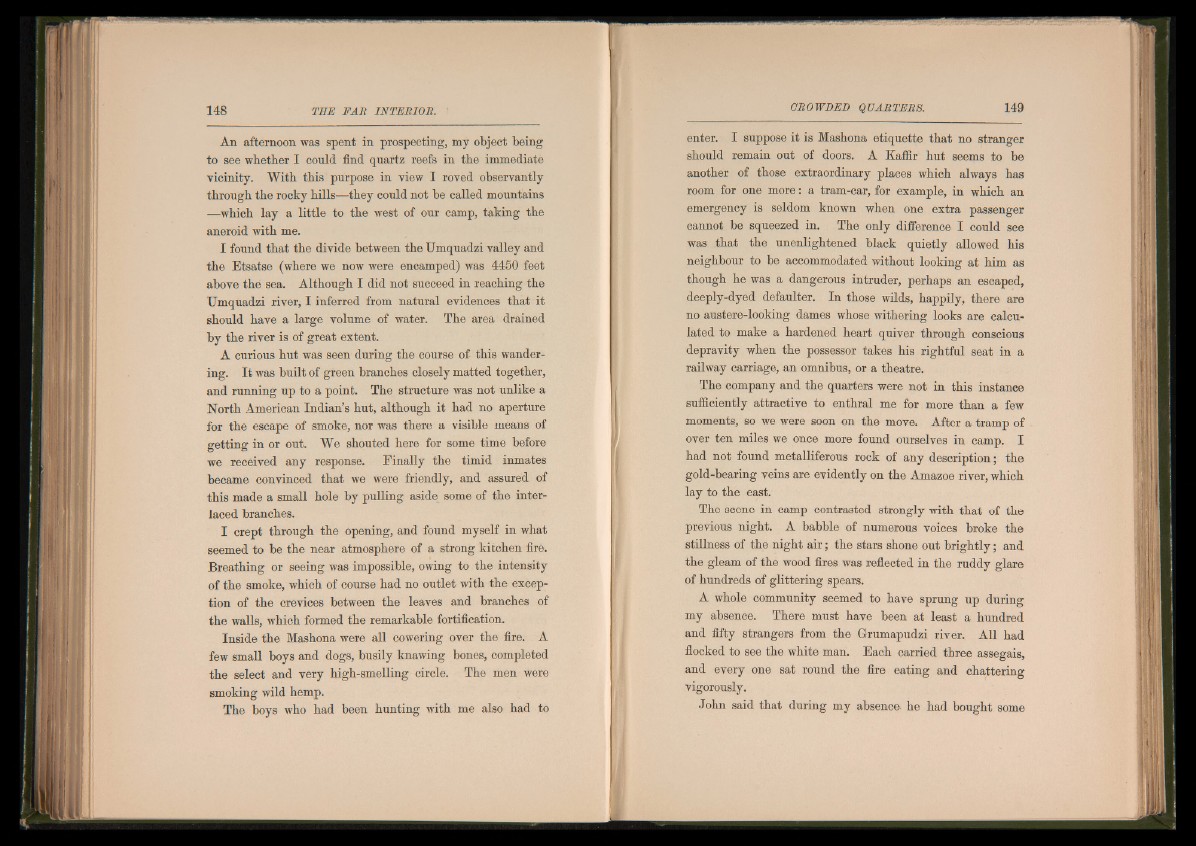
An afternoon was spent in prospecting, my object being
to see whether I could find quartz reefs in the immediate
vicinity. With this purpose in view I roved observantly
through the rocky hills—they could not be called mountains
—which lay a little to the west of our camp, taking the
aneroid with me.
I found that the divide between the Umquadzi valley and
the Etsatse (where we now were encamped) was 4450 feet
above the sea. Although I did not succeed in reaching the
Umquadzi river, I inferred from natural evidences that it
should have a large volume of water. The area drained
by the river is of great extent.
A curious hut was seen during the course of this wandering.
I t was built of green branches closely matted together,
and running up to a point. The structure was not unlike a
North American Indian’s hut, although it had no aperture
for the escape of smoke, nor was there a visible means of
getting in or out. We shouted here for some time before
we received any response. Finally the timid inmates
became convinced that we were friendly, and assured of
this made a small hole by pulling aside some of the interlaced
branches.
I crept through the opening, and found myself in what
seemed to be the near atmosphere of a strong kitchen fire.
Breathing or seeing was impossible, owing to the intensity
of the smoke, which of course had no outlet with the exception
of the crevices between the leiaves and branches of
the walls, which formed the remarkable fortification.
Inside the Mashona were all cowering over the fire. A
few small boys and dogs, busily knawing bones, completed
the select and very high-smelling circle. The men were
smoking wild hemp.
The boys who had been hunting with me also had to
enter. I suppose it is Mashona etiquette that no stranger
should remain out of doors. A Kaffir hut seems to be
another of those extraordinary places which always has
room for one more: a tram-car, for example, in which an
emergency is seldom known when one extra passenger
cannot be squeezed in. The only difference I could see
was that the unenlightened black quietly allowed his
neighbour to be accommodated without looking at him as
though he was a dangerous intruder, perhaps an escaped,
deeply-dyed defaulter. In those wilds, happily, there are
no austere-looking dames whose withering looks are calculated
to make a hardened heart quiver through conscious
depravity when the possessor takes his rightful seat in a
railway carriage, an omnibus, or a theatre.
The company and the quarters were not in this instance
sufficiently attractive to enthral me for more than a few
moments, so we were soon on the move. After a tramp of
over ten miles we once more found ourselves in camp. I
had not found metalliferous rock of any description; the
gold-bearing veins are evidently on the Amazoe river, which
lay to the east.
The scene in camp contrasted strongly with that of the
previous night. A babble of numerous voices broke the
stillness of the night a ir; the stars shone out brightly; and
the gleam of the wood fires was reflected in the ruddy glare
of hundreds of glittering spears.
A whole community seemed to have sprung up during
my absence. There must have been at least a hundred
and fifty strangers from the Grumapudzi river. All had
flocked to see the white man. Each carried three assegais,
and every one sat round the fire eating and chattering
vigorously.
John said that during my absence- he had bought some